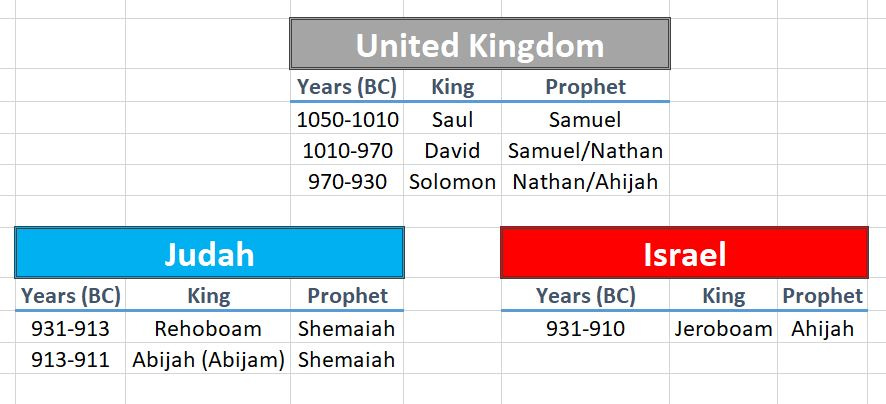The King Who Trusted God When He Was Weak, But Not When He Was Strong
The reign and life of King Abijam (or Abijah).
Abijam (as he’s called in 1 Kings) or Abijah (as he’s called in 2 Chronicles) was Rehoboam’s son who came to the throne after his father's death.
He reigned briefly but fought in the first major battle between the northern kingdom of Israel and the southern kingdom of Judah.
The Overview of Abijam’s Reign in Judah.
Abijam comes to the throne in the 18th year of King Jeroboam’s reign in the northern kingdom of Israel, and he reigns for three years in Jerusalem.
The “queen mother” was Maachah (Michaiah - 2 Chronicles 13:2), the granddaughter of Abishalom - also known as Absalom (2 Chronicles 11:20; 1 Kings 15:1-2). Maachah was King Rehoboam’s most beloved wife (2 Chronicles 11:21) and Abijah (Abijam) was Rehoboam’s hand-picked successor (2 Chronicles 11:22).
We’re told Abijam “walked in all the sins of his father” and his heart wasn’t loyal to the Lord His God, unlike the heart of King David, his great-grandfather (1 Kings 15:3). Abijam’s father’s sin was that “he forsook the law of the Lord” when he became strong (2 Chronicles 12:1).
Despite the unfaithfulness of Abijah, the Lord continued to show kindness for David’s sake by allowing his descendants to remain on the throne. The reason for this was David’s faithfulness throughout his life - except in the matter of Uriah the Hittite (1 Kings 15:4-5).
Abijah continued the war with Jeroboam, which started with his father Rehoboam (1 Kings 15:6-7).
When Abijah died after reigning for three years, he was buried in Jerusalem (the City of David) and his son Asa came to the throne (1 Kings 15:8).
Abijah’s Victory Over Jeroboam.
The Preparations.
Not long after Abijah comes to the throne, there is a major battle between the northern and southern kingdoms fought in the mountains of Ephraim - right on the border between the two kingdoms (2 Chronicles 13:4).
Judah positions themselves for battle with 400,000 choice soldiers, while Israel gets into battle formation with 800,00 soldiers (2 Chronicles 13:3).
The Speech.
Before the battle, Abijah stood on Mount Zemaraim and called out to the armies of Israel.
He reminded Jeroboam and the people of Israel that the Lord God made a covenant with David to give him the throne (2 Chronicles 13:4-5). Yet, Jeroboam and the “worthless rogues” strengthened themselves against Rehoboam when he was “young and inexperienced” and unable to stand against them (2 Chronicles 13:6-7).
And now, they thought they could also stand against God Himself - bringing their own idol gods with them (2 Chronicles 13:8). They had cast out the priests of God and made their own priests for their own gods - they had forsaken the Lord their God (2 Chronicles 13:9).
But, the southern kingdom of Judah had not forsaken the Lord God - the priests continued to offer sacrifices to Him each morning and evening, worshipping Him as He commanded (2 Chronicles 13:10-11).
And so, Abijah concluded, God was with the nation of Judah - so to fight against them was to fight against the Lord God. And that was a losing proposition (2 Chronicles 13:12).
The Fight.
While Abijah was making this speech, calling upon Israel not to fight against Judah - and by extension, the Lord Himself - Jeroboam positioned some of his army behind the armies of Judah. An ambush was set, the armies of Judah were outnumbered and surrounded (2 Chronicles 13:13).
Suddenly, Judah realizes their predicament, and they cry out to the Lord for help. And “God struck Jeroboam and all Israel before Abijah and Judah” (2 Chronicles 13:14-15). The armies of Israel retreated from the battlefield, and a great victory was won by Judah because God delivered the armies of Israel into their hand.
The Outcome.
Israel’s losses were staggering - 500,000 of their 800,000 soldiers died in battle. These losses “subdued” Israel, breaking their military strength (2 Chronicles 13:17-18). Abijah even captured several cities from the northern kingdom: Bethel, Jeshanah, and Ephrain with their surrounding villages (2 Chronicles 13:19). Once again, this great victory was “because they relied on the Lord God of their fathers” (2 Chronicles 13:18).
Not only did this loss cripple the military strength of Israel, but it broke the power of Jeroboam as king. Not long after these events, “the LORD struck him, and he died” (2 Chronicles 13:20).
But Abijah grew mighty during his brief time as king of Judah (2 Chronicles 13:21).
Crowning Principles.
Our trust in God is tested during challenging moments.
Outnumbered 2-1 on the battlefield with enemy troops in front of him and behind him, Abijah and Judah trust in God to deliver them - and He does. They won a great victory because they relied upon God in the face of overwhelming odds.
When we face challenging times and moments when we are afraid or we don’t know what to do, our trust in God is challenged. Faith trusts God and relies on Him, even during these difficult moments when we are weak (2 Corinthians 12:7-10).
Our trust in God is also tested during times when we are strong.
While Abijah trusted in God in the face of overwhelming odds and when he was weak, it seems he followed his father’s poor example of forsaking God and His law when he became mighty.
When things are going our way in life, when we feel “strong” - will we still trust God? Paul warned wealthy Christians not to trust in their financial “strength” but in God (1 Timothy 6:17-19). The church in Laodicea was rebuked because they trusted in their own strength - their wealth - rather than trusting in God (Revelation 3:14-22).






